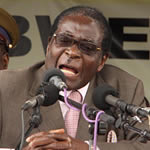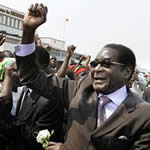Let’s beat our own drum

Heroes Acre for the men and women of letters who have given so much for their homeland.
Invariably, thoughts of Mungoshi lead to thoughts of “Waiting for the Rain”.
The title itself is as pregnant with meaning for Zimbabwe today as it was when he penned that seminal work.
But that is material for another piece.
The exchanges between the Old Man and his grandson Garabha in Waiting for the Rain tug at heart strings that are not known to exist until the reader comes across such fecund prose.
Perhaps it is the simplicity of Mungoshi’s deployment of this language foisted on us – maybe to teach us, as Shakespeare’s Caliban bellows, how to curse – that is so appealing.
Mungoshi’s simple work has attracted the textual deconstructive exploits of dons from universities from all over the world; all trying gamely to break down what it is that Waiting for the Rain means and does not mean.
Our own Dr Rino Zhuwarara’s contribution has been, “The Old Man and Garabha in ‘Waiting for the Rain’ are a more or less marooned species trying desperately to cling on to a spiritual heritage in an environment that is fiercely hostile to its preservation.”
This is because the Old Man, somewhere in that Shon-glish scribbling so characteristic of Mungoshi, resignedly tells his beautifully-flawed grandson Garabha that we are beaten when we play someone else’s drum.
It is a piece of writing that is best quoted verbatim.
The Old Man says to Garabha, “Today we ask: Where are we? Who are we? What wrong did we do?
“How many stories do we hear of the white man humiliatingour people?
“We hear it, but do we see it? We might be blind. We hear it, but do we listen? We might be deaf.
“And why? Playing the enemy’s drum, that’s why. Making so much noise with the enemy’s drum that we can’t even hear the beating of our own gullible little miserable hearts . . .
“This is what they don’t know, and because they don’t know it they are going to lose the battle before it’s even started.
“They fight for what they don’t know. We fought for what we knew . . . “
Much has changed since Mungoshi wrote these lines in 1975, and at the same time a lot has remained the same.
Zimbabwe was not yet born at the time. Mungoshi lived in some British-sired geo-political bastard child called Rhodesia.
That geo-political tragedy knew it should have been still-born but had somehow survived, thanks to ingenuities like Maxim, Gatling and FN.
It also knew that another ingenuity called AK-47 was stalking it – impatiently and hungrily – and would soon consign it to the grave it had for so long cheated.
What both Rhodesia’s FN and the soon-to-be-born Zimbabwe’s AK-47 did not fully appreciate was what Mungoshi’s pen affirmed: too many among us were playing the enemy’s drum.
Had both sides known it, so much blood would not have been shed so needlessly.
Had we known it, Chairman Chitepo would not have been murdered that very same year that the Old Man sat down to talk to Garabha.
Had we known it, Chimoio and Nyadzonya would not have spilt the blood that they reddened our already rich soil with.
Had we known it, General Tongogara would not have rushed in that beat-up vehicle to pass the glad tidings of a brave new world that was yet to come.
Had we known it, we would not have hoisted our flag so triumphantly on that night of April 18, 1980 with the politically childish glee that we did.
Had we known it, we would have known today, like we should have then, that the sovereign Zimbabwe of 2011 is a myth. We founded our Zimbabwe on a grand myth.
For some strange reason we missed what Mungoshi’s Old Man was trying to tell us so many years ago and we forged ahead with things like land reform and indigenisation without realising that we have some among us who are playing someone else’s drum.
We were living the myth that we were a united and self-determinant Zimbabwe.
We believed we had secured the revolution and yet we have some – too many, perhaps – in our midst who are too busy making noise with the enemy’s drum that they can’t even hear the beating of their “own gullible little miserable hearts”.
Where the enemy’s drum reverberated to the staccato of the Maxim, Gatling and FN yesterday, today it deceives the heart with strange talk of “targeted sanctions”.
The other day it stunk of napalm and Lord knows what manner of biological and chemical weaponry, but today it comes clothed in the sweet-smelling robes of “rule of law”, “human rights”, and “freedom of expression”.
While it stifled the scope of our existence with pieces of paper titled “Land Husbandry”, “Land Tenure”, and “Land Apportionment” just yesterday, in the here and now it waxes lyrical about “property rights” without a backward glance at Hut Tax and “chibharo”.
On March 2, 2011 in the Year of Our Lord, the Old Man returned to reassert those values that he and his peers fought for.
He tried to remind the lovers-of-foreign-drums that “tine ngoma yokwedu”.
That at the end of the day sanctions are just another musical bridge in the medley that characterises the enemy’s orchestra in our collective oppression.
That a failure to heed this drum of our own is an abrogation of our duty as a people, as a nation, as a State, to protect and project that which we are – a blood-bought creed that built Great Zimbabwe.
We are the stock of common suffering, common aspirations, common challenges and common successes.
What excuse then is there for not being part of the clarion call that is the National Anti-Sanctions Campaign?
Do we have any reason for believing that sanctions are a party issue and not one that threatens our common bondage as a people of yesterday trying to force our way into a better tomorrow?
Whence comes this spirit that makes some among us shy away from our own drum and think that the jangled, discordant noises of the enemy amount to music?
Let’s play our part, let’s play our drum.











Comments